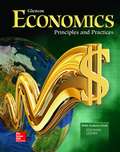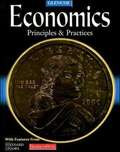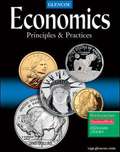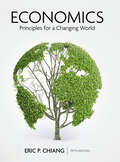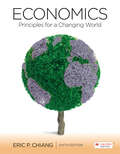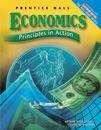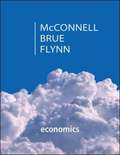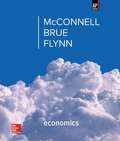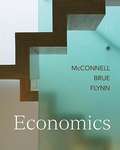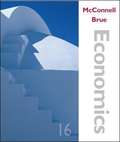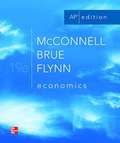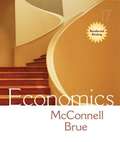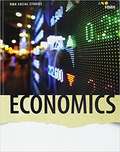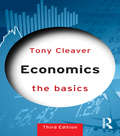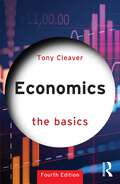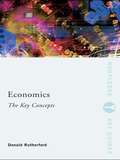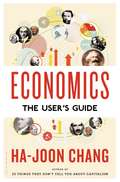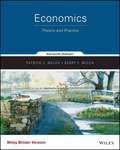- Table View
- List View
Economics: Principles And Practices
by McGraw-Hill EducationProven in the classroom, Economics: Principles and Practices provides a solid basis for learning economics for all students based on the twenty standards from the Council of Economic Education Includes Print Student Edition
Economics: Principles In Action (Economics: Principles In Action, 2003)
by Arthur O'Sullivan Steven M. Sheffrin Patricia Shehan CampbellNIMAC-sourced textbook
Economics: Principles and Practices
by Gary E. ClaytonThis book contains topics on Fundamental Economic Concepts, Micro Economics, Macro Economics (Institutions, Policies), International and Global Economics. Profiles in Economics, Economics in Action (Video Activities), Interactive Economics (Computer Activities), Surfing the Net (Web Activities), Technology Activities, Skills (Economic, Critical Thinking, Technology and Life). Also included are Charts, Maps and Graphs.
Economics: Principles and Practices
by Gary E. ClaytonThe nation's number one economics program. Economics: Principles & Practices is the only program with full coverage of the new economy and the impact of the digital revolution. It is correlated to the National Standards and, in addition to having current statistics and news events, this program has updated diagrams, charts, maps, photos, and illustrations.
Economics: Principles and Practices
by McGraw-HillThis edition of Economics: Principles and Practices includes current statistics and news events.
Economics: Principles for a Changing World
by Eric ChiangWith this edition, Eric Chiang continues to link economics concepts to topics of personal interest to students. The new edition is a thoroughly contemporary, fully integrated print/technology resource that adapts to the way you want to teach. As always, this concise book focuses on the topics most often covered in the principles course, but with this edition, it offers a stronger emphasis than ever on helping students apply an economic way of thinking to the overwhelming flow of data we face every day. Economics: Principles for a Changing World is fully informed by Eric Chiang’s experiences teaching thousands of students worldwide, both in person and online. Developing the text, art, media, homework, and ancillaries simultaneously, Chiang translates those experiences into a cohesive approach that embodies the book’s founding principles: To use technology as a tool for learning—before lectures, during class, when doing homework, and at exam time To help students harness the data literacy they’ll need as consumers of economic information
Economics: Principles for a Changing World
by Eric ChiangChiang makes fundamental economic ideas clear and relevant to the diverse range of students who take the principles course.
Economics: Principles in Action
by Arthur O'Sullivan Steven M. SheffrinThis edition covers the topics on Introduction to Economics, Microeconomics and Macroeconomics, Business and Labor, Money, Banking and Finance, Government and the Economy, The Global Economy. Also contains The Wall Street Journal Classroom Edition, a supplemental educational program in which Articles are drawn directly from the pages of the daily Wall Street Journal. Personal Finance Handbook, Economic Atlas and Databank, Graphs and Charts, Economic Profiles are additional features of this book.
Economics: Principles in Action
by Steven M. Sheffrin Arthur O’sullivanEconomics: Principles in Action is a multi-dimensional program designed to help students of all abilities achieve fundamental understanding of core economic principles. Key concepts, based on the twenty content standards of the National Council on Economic Education (NCEE), are developed throughout the program and supported by a variety of activities to help students apply their new knowledge to the real world.
Economics: Principles in Action (California Edition)
by Arthur O'Sullivan Steven M. SheffrinEconomics: Principles in Action is designed to meet every element of California's state standards for an Economics course of study. The material in the features found throughout the book is written to help you master the California standards.
Economics: Principles in Action (Texas)
by Arthur O'Sullivan Steven M. SheffrinEconomics: Principles in Action is a multi-dimensional, comprehensive high school economics program designed to help students of all abilities achieve a fundamental understanding of key economic principles and their application in the real world. Twenty key economic concepts - developed by The National Council on Economic Education and outlined in the Voluntary National Content Standards in Economics - are introduced and reinforced throughout the program. At the heart of Economics: Principles in Action is demonstrating the relevance of economics to students' lives. From case studies and videos to interactive CD-ROMs, the program clarifies key economic principles and help students understand the connections between those principles and everyday life.
Economics: Principles, Problems and Policies (Twentieth Edition)
by Campbell R. Mcconnell Stanley L. Brue Sean M. FlynnMcConnell/Brue/Flynn has long set the standard for providing high-quality content to instructors and students all over the world. It has remained the most widely used principles of economics product as a result of persistent innovation. The 19th edition brought adaptive technology to the market for the first time with LearnSmart, a resource that ensures that every minute a student spends studying is the most efficient and productive time possible. Feedback from users in combination with the analysis of student performance data from the 19th edition's digital products significantly informed the revision of the 20th edition, resulting in a product expertly tailored to the needs of today's students. With the 20th edition, students and instructors will benefit from a new offering that expands upon the dynamic and superadaptive capabilities of LearnSmart: SmartBook, the first and only adaptive eBook. McConnell/Brue/Flynn's tradition of innovation continues with the 20th edition, providing market-leading content and digital mastery to benefit today's learners. Connect is the only integrated learning system that empowers students by continuously adapting to deliver precisely what they need, when they need it, and how they need it, so that your class time is more engaging and effective.
Economics: Principles, Problems and Policies AP edition
by Campbell R. Mcconnell Stanley L. Brue Sean M. FlynnAP Economics textbook
Economics: Principles, Problems and Policies, 18th Edition
by Campbell McconnellMcConnell and Brue Economics: Principles, Problems, and Policies is the leading AP* Economics textbook, because it is innovative and teaches students in a clear, unbiased way. Taking a patient, step-by-step approach,. the authors explain the theory and models slowly and thoroughly. . The Eighteenth Edition builds upon the tradition of leadership by sticking to three main goals: - Help the beginning student master the principles essential for understanding the. economizing problem, specific economic issues, and the policy alternatives. -Help the student understand and apply the economic perspective and reason accurately and objectively. about economic matters. -Promote a lasting interest in economics and economy. .
Economics: Principles, Problems, and Policies (16th edition)
by Campbell R. Mcconnell Stanley L. BrueThe sixteenth edition is accompanied by and integrated with a phenomenal new enhancement, Discover Econ with Paul Solman Videos that brings to economics education an entirely new level of excellence and excitement not possible in earlier editions. This new program which consists of video tutorials by Paul Solman, interactive exercises and testing promises to set a new standard in the ease and excellence of economics instruction.
Economics: Principles, Problems, and Policies (AP edition, 19th edition)
by Campbell R. Mcconnell Sean M. Flynn Stanley L BrueEconomics textbook
Economics: Principles, Problems, and Policies / Edition 17
by Stanley L. Brue Campbell McconnellMcConnell and Brue's Economics: Principles, Problems, and Policies is the leading Principles of Economics textbook because it is innovative and teaches students in a clear, unbiased way. The 17th Edition builds upon the tradition of leadership by sticking to 3 main goals: help the beginning student master the principles essential for understanding the economizing problem, specific economic issues, and the policy alternatives; help the student understand and apply the economic perspective and reason accurately and objectively about economic matters; and promote a lasting student interest in economics and the economy.
Economics: Student Edition 2018 (Hmh Social Studies Economics Ser.)
by Mark C. Schug John Morton Sally MeekNIMAC-sourced textbook
Economics: The Basics (The Basics)
by Tony CleaverNow in its third edition, Economics: The Basics continues to provide an engaging and topical introduction to the key issues in contemporary economics. Fully updated to take into account the global recession, ongoing problems in Eurozone economies, changing patterns in world trade, housing and currency markets, it covers fundamental issues, including: • How different economic systems function • The boom and bust cycle of market economies • The impact of emerging markets • How price, supply and demand interact • The role of the banking and finance industry • Whether we can emerge from recession and reduce poverty • The impact of economics on the environment With a glossary of terms, suggestions for further reading and new case studies covering subjects such as the choices facing developing economies, the impact of growth on the price of natural resources and the aftermath of the financial crash; this comprehensive and accessible guide is essential reading for anyone who wants to understand how economics works.
Economics: The Basics (The Basics)
by Tony CleaverNow in its fourth edition, Economics: The Basics continues to provide an engaging and topical introduction to the key issues in contemporary economics. The new edition has been fully updated to take into account recent world economic events and key developments, such as the impact of the Covid-19 pandemic and the war in Ukraine, recurring financial crises, deglobalisation and changing patterns in international trade, the rise of China, the digital economy, rising inflation, and housing and currency markets. It covers fundamental issues, including: How different economic systems function The boom-and-bust cycle of market economies The impact of multinational corporations How price, supply and demand interact The role of the banking and finance industry Whether we can reduce poverty and protect the environment With a glossary of terms, suggestions for further reading and new case studies, this comprehensive and accessible guide is essential reading for first-year undergraduate economics students and anyone who wants to understand how economics works.
Economics: The Key Concepts (Routledge Key Guides)
by Donald RutherfordAn A-Z of contemporary economics in all its forms, Economics: the Key Concepts is an affordable, accessible reference for students, lecturers and economists at every level. The key topics explored include: competition and monopoly development economics game theory property rights taxation. Fully cross-referenced with extensive guides to further reading, this is the essential comprehensive pocket reference to the ideas, issues and practice of economics in the twenty-first century.
Economics: The User's Guide
by Ha-Joon ChangIn his bestselling 23 Things They Don't Tell You About Capitalism, Cambridge economist Ha-Joon Chang brilliantly debunked many of the predominant myths of neoclassical economics. Now, in an entertaining and accessible primer, he explains how the global economy actually works--in real-world terms. Writing with irreverent wit, a deep knowledge of history, and a disregard for conventional economic pieties, Chang offers insights that will never be found in the textbooks. Unlike many economists, who present only one view of their discipline, Chang introduces a wide range of economic theories, from classical to Keynesian, revealing how each has its strengths and weaknesses, and why there is no one way to explain economic behavior. Instead, by ignoring the received wisdom and exposing the myriad forces that shape our financial world, Chang gives us the tools we need to understand our increasingly global and interconnected world often driven by economics. From the future of the Euro, inequality in China, or the condition of the American manufacturing industry here in the United States--Economics: The User's Guide is a concise and expertly crafted guide to economic fundamentals that offers a clear and accurate picture of the global economy and how and why it affects our daily lives.
Economics: Theory & Practice (11th Edition)
by Patrick J. Welch Gerry F. WelchEconomics: Theory & Practice, 11th Edition by Patrick J. Welch and Gerry F. Welch connects theory to the practice of economics and the everyday world through examples and applications, debates, and critical thinking cases—some that are classics in the field and others that are fresh and up-to-date. Its balanced coverage of microeconomics and macroeconomics, flexibility in topic coverage order, and the use of appendices and chapter sections to shorten or deepen course material offer a choice of levels and sequences for a course.
